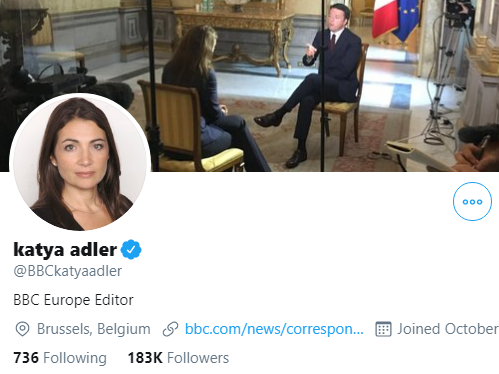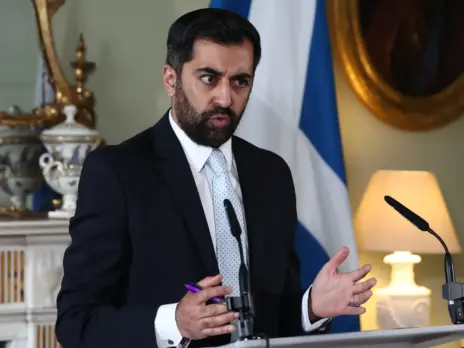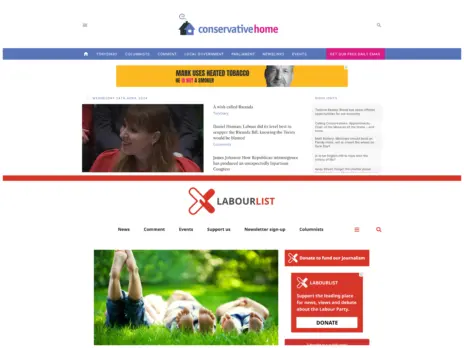
The BBC’s complaints unit has found Europe editor Katya Adler and Newsnight presenter Emily Maitlis both broke impartiality rules.
The ruling against a tweet by Adler, which labelled Cabinet Office minister Michael Gove’s hopes for Brexit “delusional”, comes as the BBC’s new director-general revealed plans to crack down on staff’s use of social media.
Adler, Europe editor since 2014, tweeted in response to comments from Gove that “the Covid crisis, in some respects, should concentrate the minds of EU negotiators, enforcing the vital importance of coming to a conclusion”.
Adler wrote a critique of his argument across a series of tweets, which began: “Am not first to comment on this today but below observation by Michael Gove that #coronavirus will focus EU minds on post #Brexit trade deal is delusional. It distracts EU leaders all the more from something which was not top of in-tray even before Covid-19.”
A member of the public complained to the BBC that the use of the word “delusional” was “loaded” and indicated a bias on Adler’s part on matters regarding the EU.
The BBC’s Executive Complaints Unit said the tweets came as part of Adler’s role to offer “informed analysis” on long-running stories like Brexit.
“The detail she marshalled in support of her initial assertion shed light on the complexity of the story in a measured and balanced way; and she acknowledged the economic dimension of the argument, while pointing out the political imperatives driving the EU towards focusing on Covid-19,” its ruling said.
“The ECU therefore did not agree that these tweets, taken as a connected series, raised questions about the overall impartiality of the BBC or Ms Adler.”
It did take issue with her use of the word “delusional”, however, as it acted more as a term of evaluation than of objective description and therefore was “necessarily to some extent an adverse reflection on the person making it”.
As such the tweet went beyond the BBC editorial guidelines’ licence for “professional judgments, rooted in evidence”, the ECU said. It reported the finding to the BBC News board and discussed it with relevant members of editorial management.
New BBC director-general Tim Davie told staff last week that one of his four priorities going forward was to urgently “champion and recommit” to impartiality.
And he said: “If you want to be an opinionated columnist or a partisan campaigner on social media then that is a valid choice, but you should not be working at the BBC.”
Davie’s warning raised questions over the extent to which BBC journalists would be able to offer their own analysis of news stories on social media.
One anonymous contributor told the Guardian: “Surely we are employed because of our knowledge, to give an overview… If we are not allowed to have personal voices this will not work.”
The ECU also published its ruling against Newsnight’s Emily Maitlis, who said in a monologue at the start of a programme in May that Boris Johnson’s chief advisor Dominic Cummings had broken lockdown rules and “shocked” the public.
The BBC’s head of news Fran Unsworth previously said the introduction “did not meet our standards of due impartiality” and the ECU has now agreed it “went beyond an attempt to set out the programme agenda”.
“The definitive and at times critical nature of the language – asserting without qualification that Mr Cummings broke the rules, that “the country could see that”, and that the Prime Minister was guilty of “blind loyalty” in refusing to sack him, placed the presenter closer to one side of the debate over his behaviour,” the ECU said.
It also said Maitlis did not sufficiently acknowledge uncertainties over the proper interpretation of lockdown rules, especially as Durham Police had yet to publish a statement on the matter.
In May the BBC backed political editor Laura Kuenssberg over complaints she tweeted “in defence” of Dominic Cummings after news broke that he had driven from London to Durham during lockdown, by replying directly to Daily Mirror political editor Pippa Crerar with a source response.
The BBC said Kuenssberg’s role is to provide audiences with an impartial analysis of events based on her knowledge and expert judgment and that on this occasion she was “simply reporting information from a source”.
The BBC also defended Kuenssberg in September last year after she quote-tweeted a Labour activist, an action that critics said led to a pile-on of abuse towards him. The BBC said she is a “journalist that uses social media as part of her job”.
In the past 18 months, the ECU has ruled on tweets from its journalists or official accounts only seven times. The others were:
- Kuenssberg inaccurately reporting on Labour MP Rebecca Long Bailey’s position on abolishing the party’s deputy leader Tom Watson’s position;
- BBC Scotland chief sports writer Tom English describing a statement from a Glasgow Rangers FC supporters’ club as “execrable” “went beyond what might be considered a reasonable expression of professional judgement, even in the context of the kind of trenchant brevity often expected of tweets”;
- Kuenssberg inaccurately tweeted a Tory advisor had been punched by a Labour activist. The BBC found “no evidence of political bias nor that [she] had failed to check the story before publication”;
- Today presenter Nick Robinson gave an “insufficiently accurate impression” of the words of a woman who he claimed had said “Jews controlled the slave trade”;
- The BBC Politics account misrepresented Green Party MP Caroline Lucas’ position on accepting the result of a second Brexit referendum;
- BBC Monitoring made an “objectionable” implication by asking whether views expressed by the Brazilian president were homophobic, racist and misogynistic or “a refreshing break” from political correctness. The tweet was quickly deleted.
Email pged@pressgazette.co.uk to point out mistakes, provide story tips or send in a letter for publication on our "Letters Page" blog






